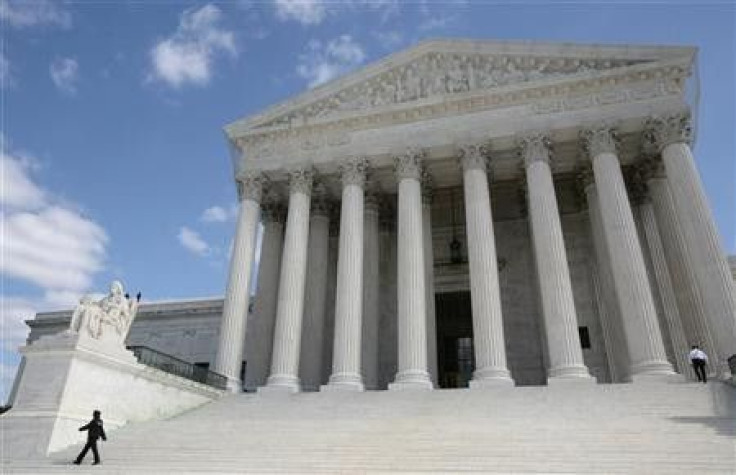Illegal File Sharing Case Poses $675,000 Question For Supreme Court

Joel Tenenbaum has said the recording industry wants to make an example out of him, a cautionary tale for teens about the dangers of illegally downloading and sharing music.
For downloading 30 songs, Tenenbaum is staring down a $675,000 jury award for the Recording Industry Association of America -- a sum that would make any file sharer think twice before downloading that Lady Gaga single.
Tenenbaum, a 20-something a physics Ph.D. and a researcher at Boston University, believes the six-figure jury award is not just outlandish, but unconstitutional as well.
He asked the U.S. Supreme Court in February to review his case, a decision the justices will have made Thursday when they held their conference. The decision is usually made public early in the week following a conference.
Armed with Republican superlawyer Paul Clement, the RIAA member companies that sued Tenenbaum -- Sony BMG Music, Warner Bros. Atlantic Recording, Arista Records and UMG -- want the Supreme Court to reject his crusade to avoid any responsibility for his unlawful actions.
Tenenbaum's counsel, Harvard Law Professor Charles Nesson, wants the justices to take the case to ensure the Copyright Act is not interpreted to extend liability beyond the scope of the law to literally millions of noncommercial consumers for literally trillions in damages.
The Crusade
With the explosion of peer-to-peer file sharing networks like Grokster and Napster in the early 2000s, the RIAA launched a legal campaign against about 18,000 people who downloaded and uploaded music files. Many settled, often for a few thousand dollars. The RIAA has since ditched the litigation campaign.
Tenenbaum, however, was one of two defendants who fought the RIAA in court after a few failed attempts to settle the case.
In the end, a jury in 2009 found Tenenbaum -- to the RIAA, a serial copyright infringer with more than a thousand songs downloaded, who lied during trial -- to have willfully violated copyright on 30 songs and ordered him to pay statutory damages of $22,500 per song for a total of $675,000 -- a sum that shocked the conscience of the judge, his counsel wrote in a Supreme Court petition.
That award was on the low side compared with Tenenbaum's fellow RIAA target, Jammie Thomas-Rasset. She tried her luck with three separate juries, but they ordered her to pay $222,000, $1.92 million and then $1.5 million for sharing 24 songs.
Tenenbaum was able to avoid a retrial; the District Court judge ruled the $675,000 award was unconstitutionally excessive. The judge cut the RIAA's award to $2,250 per song, a total of $67,500.
But the RIAA pressed its case before the Boston-based 1st Circuit Court of Appeals and won back the $675,000 award. The appellate judges rejected each of Tenenbaum's arguments, chief among them that damages outlined in copyright law were intended for those that profit from downloading, not a music fan in college.
Tenenbaum is not a 'consumer-copier,' a term he never clearly defines, the court opinion said. He widely and repeatedly copied works belonging to Sony and then illegally distributed those works to others, who also did not pay Sony.
In a Supreme Court brief, Clement, the RIAA's top counsel, piled on, criticizing Tenenbaum's strained efforts to recharacterize his conduct as noncommercial and uninjurious.
With the $675,000 jury award back in place, the appeals court kicked the case back down to the trial judge, who must consider whether Tenenbaum should be granted a remittitur, a legal maneuver that lets a court reduce the amount of an excessive jury award.
Even though Tenenbaum lost, the penalty he faced caused the appellate judges to note that this case raises concerns about application of the Copyright Act which Congress may wish to examine.
Filesharing Back At The Supreme Court?
While Tenenbaum awaits the Supreme Court's decision on taking his case, his legal odyssey continues in trial court on remand. The district judge will decide whether to cut the award through the remittitur process -- giving the recording giants the option to accept the reduced amount or get a new trial -- or move on to the question of whether the jury award was unconstitutionally excessive.
Tenenbaum wants to avoid being locked in an endless cycle of retrials at the behest of corporate plaintiffs whose goal has been to overwhelm and bankrupt noncommercial individual defendants with the asymmetric burden of federal litigation.
The record labels have indicated that if the jury's award is remitted, they will most likely choose a new trial, Tenenbaum's counsel writes in the petition.
Instead, Tenenbaum asked the Supreme Court to overturn the appellate decision that ruled all filesharers are infringers who could be forced to pay thousands of dollars per song when there is no requirement to prove record labels suffered actual damage.
This pernicious interpretation of the Copyright Act, Tenenbaum's brief says, transforms every bit in cyberspace into a potentially exploding lawsuit and is sparking the development of a spam litigation industry.
© Copyright IBTimes 2024. All rights reserved.











